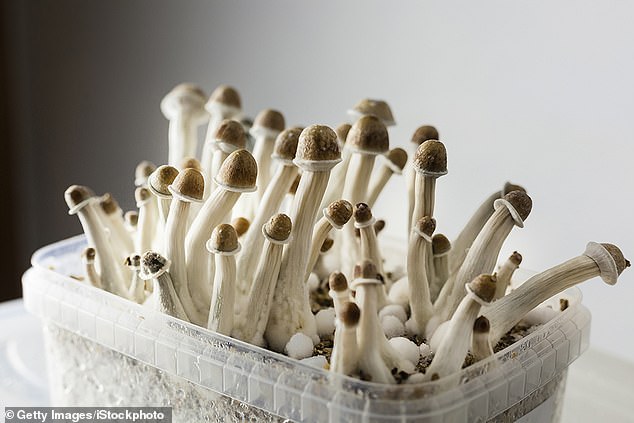More than one in 10 people undergoing trendy psychadelic mushroom therapy — endorsed by celebrities including Prince Harry — experience ‘significant psychological distress’, concerning data today suggested.
Experts in the US, who tracked the self-reported behaviours of almost 10,000 psilocybin users, discovered hundreds of reports of paranoia, intense fear and even vivid hallucinations.
One claimed to experience ‘feelings of dying, impending doom, torture’ on psilocybin — the active component of magic mushrooms used in therapy — adding it felt like ‘being thrown into hell’.
Another warned they ‘saw demons, skeletons, slugs, roaches, ghosts… me disappointing my parents’.
Experts today acknowledged the findings were merely observational but cautioned they ‘warrant serious consideration and should not be overlooked’.


Experts in the US, who tracked the self-reported behaviours of almost 10,000 psilocybin users, discovered hundreds of reports of paranoia, intense fear and even vivid hallucinations. One claimed to experience ‘feelings of dying, impending doom, torture’ on the psychedelic — the active component of magic mushrooms — adding it felt like ‘being thrown into hell’


Last year Prince Harry also admitted to using psilocybin and ayahuasca —a plant-based psychedelic from the leaves of a shrub


He said he took the drugs in an attempt to help him heal the ‘grief’ and ‘trauma’ he felt after the death of his mother. Pictured, Harry with Princess Diana in 1987
Psychedelic drugs such as LSD, magic mushrooms, ketamine and ecstasy (or MDMA) have long been touted by some British psychiatrists as a respectable new therapeutic answer for mental illnesses such as depression, post-traumatic stress disorder (PTSD) and substance abuse or addiction.
Psilocybin itself has been promoted as a promising therapy for depression and alleviating social anxiety in people with autism.
Last year Prince Harry also admitted to using it and ayahuasca —a plant-based psychedelic from the leaves of a shrub — in an attempt to help him heal the ‘grief’ and ‘trauma’ he felt after the death of his mother.
When someone takes magic mushrooms, the psilocybin is converted in the body to psilocin, which binds to serotonin receptors in the brain to create a hallucinatory effect.
Psilocin can also cause over activity in the frontal cortex of the brain, which is the region responsible for helping with the performance of motor tasks as well as high-level cognitive function such as judgement, abstract thinking, and creativity.
This overactive frontal cortex leads to changes in consciousness, altered perceptions, and shifts in thinking patterns.
The researchers, from Healthnews, tracked user experiences from the Shroomery, a popular online forum similar to Reddit where people share advice and their own psychedelic trip behaviours.
They then ran these through the AI chatbot ChatGPT to analyse language used.
‘Sentiment analysis categorizes the reports based on emotional tone into positive, negative, or neutral’, the experts claimed.
No other details on how the research was conducted, were shared.
Experts found almost half (42.4 per cent) of reports were positive and 13.57 per cent negative.
Among the common negative keywords used to describe experiences included anxiety (1,260), fear (1,000), panic (980), nausea (690) and paranoia (260).
One anonymous user claimed they were forced to ‘turn off every light’ after taking psilocybin.
‘Each minute that went by the trip only got stronger. I couldn’t stand it. I couldn’t handle looking at anything, so I shut my room, turned off every light, and laid in bed, only leaving for the occasional need to vomit outside,’ they said.
Another, reported existential dread questioning their reality and existence.
‘My mind could not relate to anything. All the social life seemed alien to me. […] I felt I had gone mad and would need to go to a mental hospital. I cannot define this state. It was like nothing mattered,’ they wrote.
Common triggers for ‘bad trips’ included high dosage, pre-existing mental health issues such as anxiety or depression and a lack of preparation prior to taking the drug, experts said.
The findings add to a growing body of research sounding the alarm over psilocybin’s concerning side effects.
One 2023 study in the journal PLOS One culled records from over 600 people’s experiences following the use of psilocybin, LSD, ayahuasca, cannabis, MDMA, DMT, ketamine, mescaline, and salvia.


Common triggers for ‘bad trips’ included high dosage, pre-existing mental health issues such as anxiety or depression and a lack of preparation prior to taking the drug, experts said. The findings add to a growing body of research sounding the alarm over psilocybin’s concerning side effects
Recalling their experiences, one anonymous user, interviewed by the British researchers, said: ‘I stayed up for three days after dosing and went into psychosis.
‘I believed all my friends were ‘spies’ talking to me to make fun of me. I was also throwing stuff at the wall and talking about wanting to kill myself on day three. This belief persisted until I’d been on an antipsychotic for months.’
Supporters of psychedelic therapy, however, argue that bad trips are rare, and even when they do occur they often provide challenging personal insights that fuel healthy psychological growth.
Proponents also point to the presence of a therapist in the trials, during the entire time the patient is under the influence of hallucinatory drugs.
In February 2022, David Nutt, a professor of neuropsychopharmacology at Imperial College London, co-authored a review of research, in the Journal of Psychopharmacology.
It claimed psychedelic drugs have an unwarrantedly bad reputation and argued ‘many — albeit not all — of the persistent negative perceptions of psychological risks are unsupported by the currently available scientific evidence’.
Professor Nutt was fired as chair of the independent Advisory Council on the Misuse of Drugs (ACMD) in 2009 by Labour Home Secretary Alan Johnson after producing a paper for the Home Office which claimed Class A drug ecstasy is safer than equestrian sports.
He also recommended that cannabis, ecstasy and LSD should be considered less harmful than alcohol and cigarettes.
- For confidential support visit the Samaritans website or call the helpline on 08457 909090
Source: Mail Online







